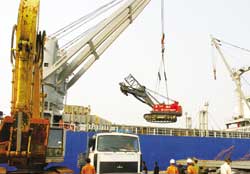Tight hold to be kept on monetary policy montay policy
The State Bank has confirmed its monetary management will remain tight to the year’s end amid rumors of a base rate cut. According to a State Bank source, the central bank would not reduce the base rate to 12 per cent.
 Tariff measures appear to be finding their mark with reduced machinery imports |
Specific consumer price index (CPI) weights for fuel-related items are not available, but the International Monetary Fund estimates the direct fuel-related weights to be around 3 per cent. Thus, according to Morgan Stanley, the fuel hike will add about 0.9 per cent to the headline CPI.
During the first seven months of 2008, the CPI has increased by 19.78 per cent. However, in July alone, the index rose just 1.13 per cent, the lowest monthly leap since the beginning of the year. In July, according to the State Bank source, credit growth was less than 1 per cent bringing the aggregate credit growth over the first seven months of 2008 to around 21 per cent.
“However, from historic view, the credit growth in June, July and August are normally lowest in a year. The growth would accelerate from September through to the year’s end”. Prakriti Sofat, an HSBC economist, said despite the State Bank’s tightening, having raised base rate by 5.25 per cent in May and June, the State Bank should increase an additional 1 per cent in the base rate.
“On the other hand the subsidy-cut related inflation boost might just trigger one last hike from the State Bank to convince the market that the authority remains committed to control the inflation problem,” said Sofat.
However, according to the State Bank source a further hike in the base rate could be “not appropriate” at this moment as it could bite into manufacturing sector. Vietnam’s economic growth slowed to an eight-year low of 5.8 per cent year-on-year in the second quarter of 2008.
According to Morgan Stanley, Vietnam’s inflation and balance-of-payments (BOP) pressures have eased in July, 2008 but a higher base interest rate could further ease BOP pressures. In July, the trade deficit was just $800 million, slightly up from the $736 million in June but far lower than the $2-3 billion deficit in the first four months of 2008. The cumulative deficit for the first seven months of 2008 was $15 billion. However, according to Morgan Stanley, monetary policy tightening and tariff measures appear to be reaping results with moderation in machinery imports, steel products and automobiles.
What the stars mean:
★ Poor ★ ★ Promising ★★★ Good ★★★★ Very good ★★★★★ Exceptional
Related Contents
Latest News
More News
- Cashless payments hit 28 times GDP in 2025 (February 04, 2026 | 18:09)
- SSIAM and DBJ launch Japan Vietnam Capital Fund (February 04, 2026 | 15:57)
- Banks target stronger profits, credit growth in 2026 (February 04, 2026 | 15:43)
- Vietnam on path to investment-grade rating (February 03, 2026 | 13:07)
- Consumer finance sector posts sharp profit growth (February 03, 2026 | 13:05)
- Insurance market building the next chapter of protection (February 02, 2026 | 11:16)
- NAB Innovation Centre underscores Vietnam’s appeal for tech investment (January 30, 2026 | 11:16)
- Vietnam strengthens public debt management with World Bank and IMF (January 30, 2026 | 11:00)
- Corporate bond market poised for stronger growth cycle (January 28, 2026 | 17:13)
- Vietnam's IPO market on recovery trajectory (January 28, 2026 | 17:04)

 Tag:
Tag:




















 Mobile Version
Mobile Version